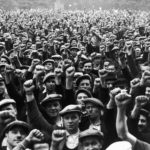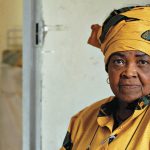Looking through Philosophy in Black
Philosopher Mabogo P More’s new memoir is a compelling reflection on the lived-experience of looking through philosophy in Black.
Author:
11 December 2018

Mabogo P More is one of South Africa’s great living philosophers. His philosophical memoir, Looking through Philosophy in Black: Memoirs, reaches forth from townships to philosophical societies to the creative philosophical significance of jazz. It offers an important testament of the human spirit to learn, know, and, through the ironic resources of resistance and struggle, to love.
More’s life and thought manifest the value of which the famed African-American philosopher, literary scholar, mathematician, and educator Anna Julia Cooper had in mind in her provocative essay, “What Are We Worth?” One is worth quite a lot when one gives more than what is invested in one — to give, proverbially, more than one receives.
More has given far more to South Africa, the country of his birth, than he received. What he expected, however, is not what those whose values are governed by market forces would proffer. A man guided by commitment and love for a people and their struggle for dignity and freedom finds little value in conventional forms of recognition.
A witness to the codification of the racist policies of the British colony and its descent into deepened wretchedness as the Republic of South Africa from his childhood into his adolescence, More was keenly aware of what it meant to fight, day by day, for life in a world that offered continued degradation and despair. What is life, he queried during those years, in a society that offered living death?
When reason is unreasonable
Living at a gut existential level the old Marxist adage of needing to change the world instead of only interpreting it, how then, did that young man from the late 1940s end up dedicating his life to the cultivation of thought as a crucial element in the lives of those the famed Martinican revolutionary psychiatrist and philosopher Frantz Fanon called the damned of the earth? He faced, after all, the ongoing plight of Black intellectuals, all of whom encounter, in one form or another, the folly of reaching out to a reason that recoiled from their outstretched arms. How, as so many thinkers (from the eighteenth-century Fanti philosopher Ottobah Cugoano, to Frantz Fanon) wondered, could reason at times be so unreasonable?
Related article:
Something was awry. Euromodern intellectual history offered a long list of explanations — many under the banner of philosophy and science — of the supposed legitimacy of its colonisation, enslavement, and the supposed racial inferiority of African peoples. If reason were complicit in the rationalisation of human degradation, something must have been wrong with reason. To get reason to listen while it took flight raised the problem of its submission, of making it bend to demands, which smacked of violence. The ironic struggle unfolded. The Black philosopher must address unreasonable reason reasonably. This reasoning with unreasonable reasoning pushed the Black philosopher’s relationship to philosophy into the realm of existential melancholia.
The Black philosopher is, after all, a philosopher, which means, if reason behaves in a racist way, belonging to a world from which such a philosopher is rejected. Belonging to not belonging is nothing short of neurotic. What can Black philosophers do?
As all philosophers, Black philosophers must “think,” but given the exigencies of life posed in antiblack societies, such philosophers cannot think in terms leisurely or luxurious. Thinking is always wrought with urgency. To think is to live despite the absurdity of almost overwhelming odds; yet, for them, to live is to think. Thinking is a defiance of the spirit in a world attempting to crush the life of thought, and by extension resistance, from its rightful home in what swells the bosom of each human being with Cooper’s insightful worth: freedom and love.
From black to Black
Embody freedom through not only writing what one likes, as the martyred revolutionary Black philosopher Steve Bantu Biko declared, but also loving each other with fierce defiance. That expression of freedom brings a powerful source of value. It threatens the world of racism with the racists’ greatest fear: their irrelevance.
The result is a transition from black to Black. Instead of being a stratified black with nowhere to go there is the Black who looks ahead, the Black who acts, the Black who understands the demands of political responsibility. That Black defiantly thinks what she or he wishes, and in so doing explores a different possibility.
Related article:
More offers this memoir of what the lived-experience of looking through philosophy in Black offers. Though at times autobiographical, it is properly a memoir in the sense that it focuses on a specific topic and its series of relevant events as experienced by the author. In her 2018 workshop on autobiography and memoirs presented at the Literary Festival and Book Fair in St. Croix, Virgin Islands, the Antiguan writer Jamaica Kincaid articulated the difference this way: an autobiography has the self as the ultimate object of reflection; a memoir has an event or other phenomena beyond the self.
More’s concern here isn’t Mabogo P. More. He is concerned about this discipline called “philosophy,” the question of the feasibility of its practice under colonial and racist conditions, and the importance of African diasporic philosophy or Africana philosophy for the cultivation of an intellectual home for a dispossessed humanity. It is in effect, then, a work in metaphilosophy — a work about philosophy — with an important critical reflection. If philosophy has been practiced in a racist way, as the many white philosophers about whom he writes performed it in apartheid South Africa, and unfortunately continued to do so in what is officially post-apartheid South Africa, can its methodological resources of self-questioning be trusted? If not, then breaking from the genres of hegemonic practice is crucial. The memoir is thus a rupturing medium. It is, as with Fanon’s famous “Lived-experience of the Black” in his 1952 classic Black Skin, White Masks, an announcement of a point of view from a subject presumed incapable of having a point of view, a thing locked in pure externality. Having a point of view — and a Black one at that! — announces a consciousness unleashing the existential Look onto Euromodern society, here marked by what it claimed was its exception but instead turns out to be its truth: apartheid South Africa wasn’t an aberration of Euromodernity but its nakedness, its truth laid bare.
Related article:
Looking through philosophy in Black is to peer into truth. To do so, however, requires doing more than looking. It also requires traveling. More offers these sojourns, as his South African experience was transformed into the African diasporic or Africana one of negotiating the shadow that trails each person of African descent in the Euromodern world. This memoir thus becomes more than a story of Black consciousness of philosophy in South Africa but also global Black thought. Given the underlying demand of truth, this book is also philosophy unveiled.
Kindred spirits
I first encountered Mabogo More through a no longer new medium: electronic mail. My first book Bad Faith and Antiblack Racism was published in January 1995. Several months later, I was greeted on my office computer with a short note in which More voiced his excitement about finding the book in a township library.
The people in the townships understood the importance of intellectual nutrition, despite their constant hunger for material resources in a country of imposed scarcity. To spend their limited funds on an existential phenomenological treatment of antiblack racism required great interest and commitment. In similar kind, More regularly found his way to township libraries because the texts read by the people for whom his love and commitment brought him back to the country mattered to him. A student of existential philosophy, which he saw manifested in the revolutionary thought of Steve Bantu Biko and which he respected in the courageous philosophy of Frantz Fanon and Jean-Paul Sartre, More instantly recognised a kindred spirit. He held in his hands a text of Black existential philosophy, which was also part of Africana existential philosophy.
From that initial contact, More brought me into the world of those precious texts not available in the United States and eventually time well spent in institutions ranging from the Worker’s College in Durban, South Africa, to the many historically Black universities across the country. The commitment to continued learning and the realisation of being part of something greater than ourselves facilitated our contributions to the explosion of work in Africana philosophy from the 1990s well into the present. This led, as well, to rethinking African intellectual history, and as subsequent generations began to question, they began to take heed of a basic insight: post-apartheid makes no sense if it maintains apartheid-infused institutions of economics, education, government, and spiritual life.
More’s work, then, became crucial features not only of the ongoing decolonisation of philosophy but also the challenge of going beyond decolonisation to the question of the new concepts and institutions for a better society and its concomitant ways of thought. And what else does that involve but to work toward setting afoot, as Fanon demanded, a new humanity?
Related article:
In my book An Introduction to Africana Philosophy, I argue that Africana philosophy addresses the interconnectedness of three fundamental questions raised from the historical circumstances of an African diaspora. They are: (1) What does it mean to be human? (2) What is freedom? and (3) Is justification any longer justifiable? I reformulated the last as the metacritique of reason. More’s work is a meticulous interrogation of what it means to be human, the importance of dignity and freedom, and the dynamics of philosophical and political reasoning. It is these elements of his work that have earned him a place not only in African philosophy but also Africana philosophy.
It was an honour and privilege to stand with Mabogo More, twenty years after our initial correspondence, on the stage in Riviera Maya in 2015 at the Caribbean Philosophical Association international conference. More was at the first meeting of the association, which took place at the Accra Hotel in Barbados in 2004. That conference had begun with our looking eastward across the Atlantic Ocean to Africa, from where the ancestors of so many participants were kidnapped. Many members of the organisation have spent much time on the continent.
Appreciation for Mabogo More’s sticking to his commitments was expressed in the Caribbean Philosophical Association’s conferring on him its Frantz Fanon Lifetime Achievement Award. He accepted his award with a speech that occasioned a standing ovation.
This is an edited excerpt from Lewis R Gordon’s introduction to Looking Through Philosophy in Black: Memoirs by Mabogo More. The full version of the introduction is available on the Roman & Littlefield site.




